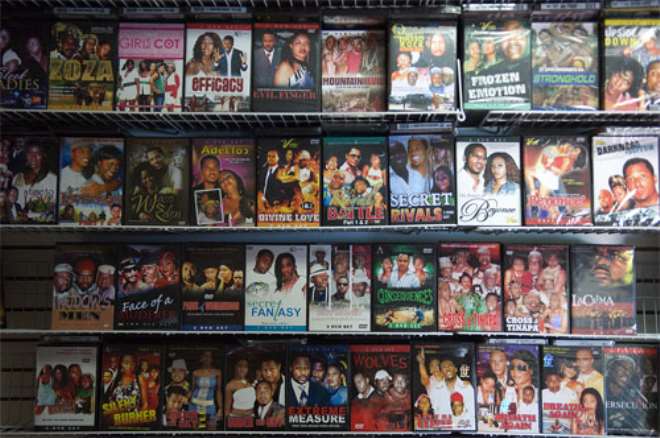NIGERIA: BOOMING LOCAL FILM INDUSTRY HURT BY SEX SCANDAL
Fury over a sex video in Moslem northern Nigeria has all but finished a flourishing local film industry that employed thousands of people, but was under scrutiny by clerics and officials.
Nigeria is well know for its "Nollywood" video production in the country's south, which turns out about 200 films a month that play in English as well as the local Yoruba and Igbo languages, throughout West Africa.
The northern "Kannywood" industry, though bigger, is lesser known as it is accessible only to Hausa speakers, a language used among Muslims across the region.
The sex video that triggered the scandal involved popular local actress Maryam Hiyana and was filmed in 2006 on a cellphone during a private tryst and never intended for public distribution.
But it got out, prompting the state government to slap a six-month ban on any video production in Kano, the biggest city in Nigeria's north and the one that gave "Kannywood" its name. Though it ended this month, the ban was followed by 32 new restrictions that, operators say, make production all but impossible.
"We were shocked when the pornographic clip appeared because we never expected such behaviour from any actress - we had been counselling them on the need to be careful about their private lives," said Aminu Sharif Momoh, head of the Kano Guild of Artistes, and himself a film director, producer and actor.
"We knew there would be consequences but we didn't anticipate it would be this severe," he told AFP. "The ban has dealt a lethal economic blow to the industry. Some performers have become destitute."
Kannywood had already been under close watch by Muslim clerics and government officials who believed it promoted un-Islamic foreign values. So when the video clip did the rounds of nearly every cell phone in Kano state, it gave those lobbying for a clampdown the ammunition they needed.
During the six-month ban, the Kano-based industry lost about 3.5 billion naira (29 million dollars, 20 million euros), Momoh said. And operators say the new restrictions on actors and film companies are just as crippling.
Among the most contested is a requirement for each film company to have capital of at least 2.5 million naira (around 21,000 dollars, 14,000 euros).
-- 'One person's private life was used to judge thousands' --
The government, meanwhile, prohibited Hiyana from appearing in films for five years, and censored all productions in which she has already acted. As a result, the Censor Board has refused to screen dozens of unreleased films featuring the actress.
This has created a Catch-22 -- heavy losses for producers who cannot release pending videos to raise the newly required capital.
"Where does the government want us to raise 2.5 million naira when the censorship board has refused to screen the dozens of new films that Hiyana acted in?" Iliyasu Abdulmumini, a local director and producer, told AFP.
"The government was unfair to the industry by using one person's private life to judge thousands of her professional colleagues," said Kabir Maikaba, a popular actor.
Kannywood started up in 1992 with just seven production companies. Over the next decade it expanded to 268 production outfits and 40 editing studios, employing over 14,000 people, the Kano chapter of the Motion Pictures Practitioners Association of Nigeria (MOPPAN) said.
"In six months we have lost 300 films we would have produced had the government not placed the ban on us. At the moment there are 850 new films which the Censorship Board has refused to screen," Momoh complained.
On the other side of the argument is Abubakar Rabo, head of the Kano film censorship board and former deputy chief of the Kano sharia religious police, the Hisbah.
"I want to make it categorically clear," he said, "that religion, culture and public dignity cannot be compromised by any good government in the name of economic interests pursued by a segment of society."
Rabo accuses Kannywood of copy-catting Hollywood and Bollywood values instead of portraying hausa society, while Guild head Momoh says the Hausa like all societies are in constant flux.
One of the new restrictions seen as the most hurtful is a ban on singing and dancing. Producers say this is precisely what attracts young people to the Kannywood films and that without it viewer numbers will plummet.
Another is the requirement for actors to have at least a secondary school- leaving certificate, while directors and producers must hold at least a diploma in cinematography.
Many Kannywood performers have no formal education and film operators fear the rule will deprive the industry of new talent and kill creativity.
"A number of directors and producers learned on the job, said Momoh, who believes "this new rule is a clear indication the censorship board is intent on killing the industry."
Latest News
-
 Actress Biodun Okeowo Celebrates Lege Miami On His
Actress Biodun Okeowo Celebrates Lege Miami On His -
 Davido's 'With You' Ft Omah Lay Official Video Hi
Davido's 'With You' Ft Omah Lay Official Video Hi -
 "I'm Ready For My Next Husband" - Ka3na Reveals
"I'm Ready For My Next Husband" - Ka3na Reveals -
 "I Humbly Suggest You Bring Back The Cashless Poli
"I Humbly Suggest You Bring Back The Cashless Poli -
 Yul Reacts To Photo Of New Born Daughter Being Use
Yul Reacts To Photo Of New Born Daughter Being Use -
 Burna Boy Reveals That He Is Considering Having Ki
Burna Boy Reveals That He Is Considering Having Ki -
 "Nollywood's Growth Requires Sacrifices From Curre
"Nollywood's Growth Requires Sacrifices From Curre -
 "Everyday With You Is A Blessing" - D'banj Celebra
"Everyday With You Is A Blessing" - D'banj Celebra -
 Nkechi Blessing Flaunts New Man On Social Media, D
Nkechi Blessing Flaunts New Man On Social Media, D -
 Yhemolee Celebrates Son As He Clocks Six Months
Yhemolee Celebrates Son As He Clocks Six Months














